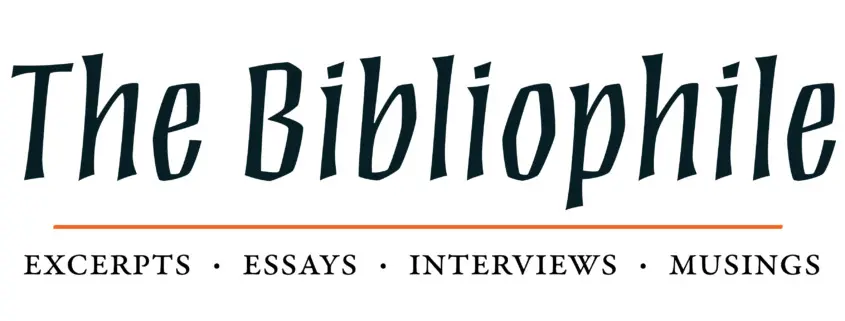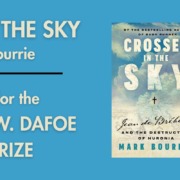The Bibliophile: A reminder of their humanity
Want to get new excerpts, musings, and more from The Bibliophile right away? Sign up for our weekly online newsletter here!
***
The introduction to Voices of Resistance: Diaries of Genocide
Last week another ceasefire was declared in Palestine. This is the third one in two years. I think we all hope this ceasefire will hold, but it is difficult to be certain if it will. In these past two years, we’ve seen countless photos and videos of people in pain, of bombs being dropped on innocent people, of cities in ruin, of Palestinians being starved and stripped of their humanity. It is hard to see all that death and destruction and not want to do something about it.
Three days ago, we published the North American edition of Voices of Resistance: Diaries of Genocide, a collection of diaries by Batool Abu Akleen, Nahil Mohana, Ala’a Obaid, and Sondos Sabra; four Palestinian women, all poets and writers, documenting their daily lives in Gaza from October 2023 to March 2025.
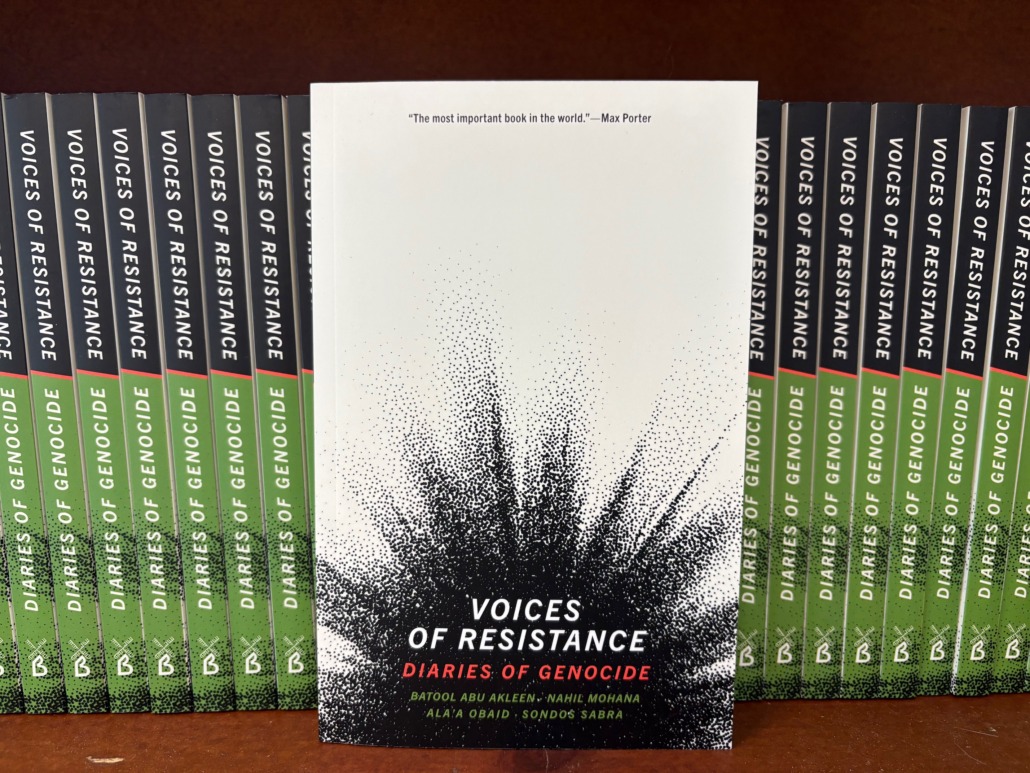
Their diaries provide a rare and intimate perspective, giving us an on-the-ground, real-time look at what it is like to live during a genocide. It is a beautifully written, devastating account filled with unimaginable heartbreaking moments and ordinary relatable ones. Faced with constant bombing and multiple displacements, it shows how they adapt and persevere with empathy and humour. Thoughts of fear and death mix with nostalgia for a more peaceful time and the practical, mundane tasks of life that must go on, as well as hope for the future. This is a book about resilience as a form of resistance. It is a reminder of the violence that happened, but also of their humanity and their refusal to be silenced or erased from history.
Below you’ll find the introduction to the collection written by Caryl Churchill. You can also read an excerpt from one of Sondos Sabra’s diaries in the Truthdig, and a new entry from her published yesterday in the Guardian. All the money we make from this book will go directly to the authors and their families. I hope you’ll consider buying a copy.
Ahmed,
Publicist
Introduction to Voices of Resistance
by Caryl Churchill
We all know what’s happening in Gaza. Or we know something of it. Some people may not have thought about it before and imagine the trouble started when Hamas broke into Israel in October 2023. Others know more of the history of Palestine including, in relatively modern times, the British Empire, Zionism, the Nakba, the founding of Israel and the oppression and occupation that have gone on for 77 years.
But what very few of us know is what it’s like to be in Gaza. Though we can see it on our screens, we can’t go there. For many years it’s been almost impossible to visit friends or simply visit the place, like any other place, and almost impossible to leave what has effectively become a large prison. After October 2023, what we saw on our screens was heavily weighted towards the Israeli families who’d had hostages taken. Their characters and suffering were individualised while, as more and more Palestinians were being killed, Gazan sufferings were often just reported as numbers. We could learn more from Al Jazeera and sometimes from Channel 4. Even the BBC has recently begun to show what is happening, as people have become more and more incredulous and appalled.
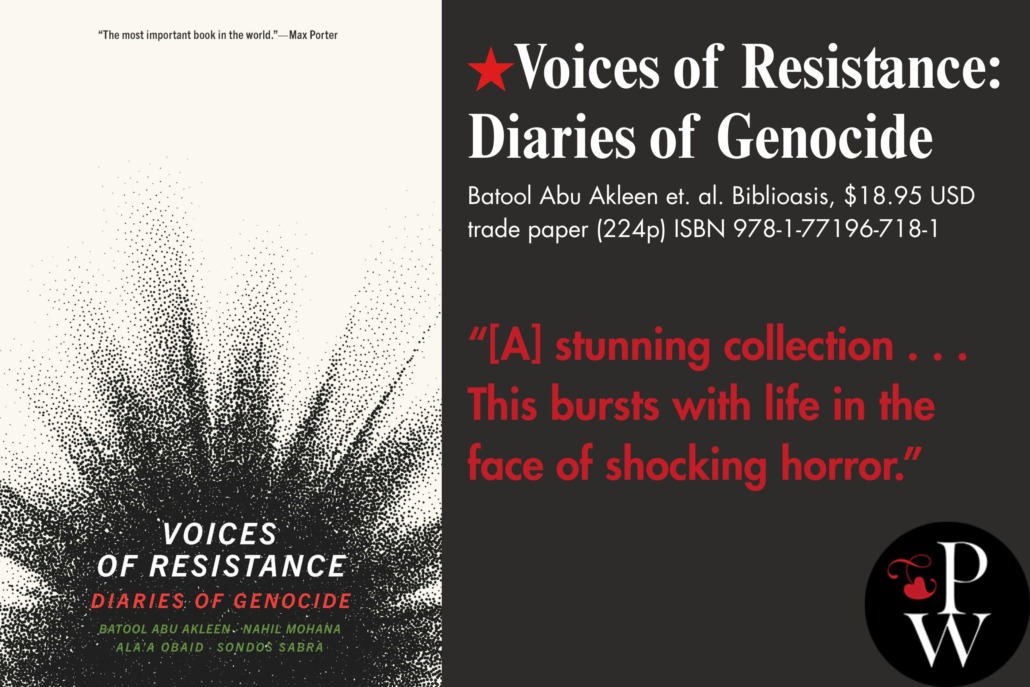
But with any long catastrophe, there’s a danger that those of us outside of it become numbed, or distracted by the ins and outs of our own lives. Whether it’s a war, an earthquake, or a famine, the watcher can begin to feel—however much they know it’s not true—that the suffering people are those suffering people; that it’s somehow not the same as if the bomb had fallen in our own street, or our own children had no water to drink. But for these four women the ins and outs of their lives are suddenly astonishingly changed and we can see and feel that.
History, of course, is often the victors’ story. Israel wants that story to be theirs and is quick to try to suppress others. In 2024, Comma, the [UK] publisher of this book, took a show of Palestinian readings to HOME arts centre in Manchester—it was cancelled because of Zionist protests then reinstated because of local sup-port. It went to Edinburgh and then to the Barbican, where extracts from some of these diaries were added, and where UK Lawyers for Israel labelled it ‘illegal’. Though so much else was happening to them, these readings meant something important to the writers: their voices were being heard.
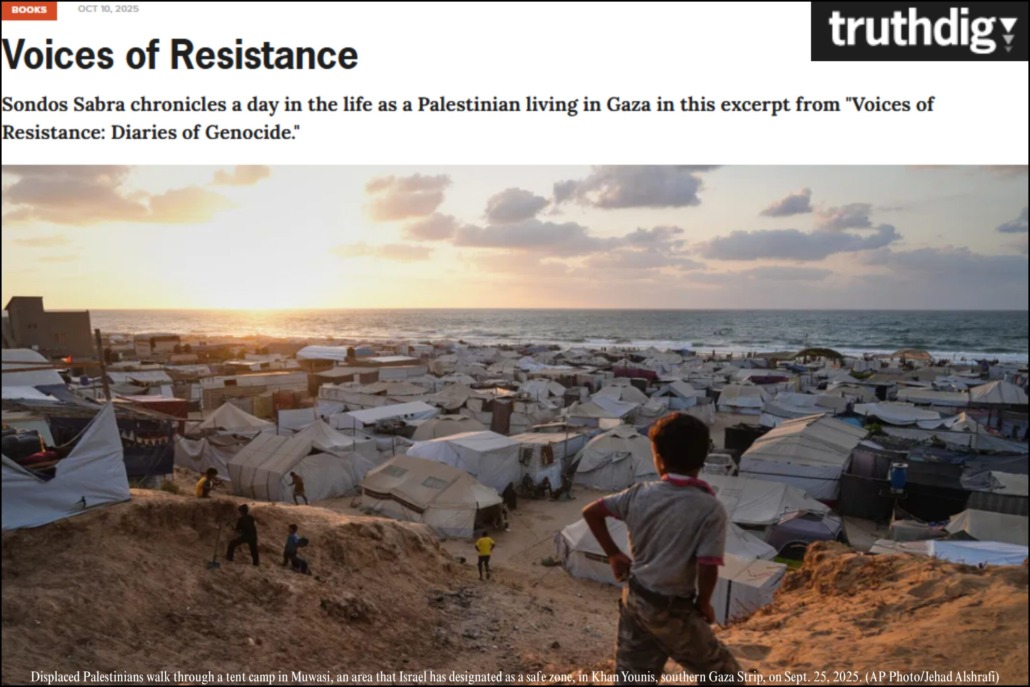
Here is what it’s like to leave your home and leave again and again, be parted from your family, have a bomb fall next door, shells burst through the window, a tank attack you, lose your friend, lose children. And how ordinary things keep on at the same time, anxiety about an exam while under bombardment, and here, ordinary things change: sharing a bathroom with 30 people, queuing hours for bread, looking all day for an egg for a birthday cake, climbing over rubble as you walk down the street. Here are so many loves: for a strong father aged by war, a four-year-old sister helping make dough, a daughter playing games on a phone, a younger brother who likes to wear white and is seized and tortured, a childhood friend to laugh with, so many in each family. Here is food: the biscuit that crumbles like snow and later the food shortage, the boredom of peas. Here is a cat carried in a bag and the fat cats who have fed on rubbish and human corpses. And here is constant death: the big young man whose shroud holds remains as small as a baby’s, the nephew deaf in one ear who liked watching anime, the baby whose first tooth had just come through, the child who died as she slept and her mother’s wail: ‘I wish I hadn’t put her to bed early.’
Here is a birth and what that’s like when hospitals can hardly function, the baby falling on his head but unharmed, the death of the friend who brought baby clothes a few days earlier. Here are jokes about the things Gazans now hold records for, and the noises made by different weapons, and the seller of cigarettes: one for six, two for fifteen. Here are memories of what it was like before and a determination that one day ordinary life can be lived again.
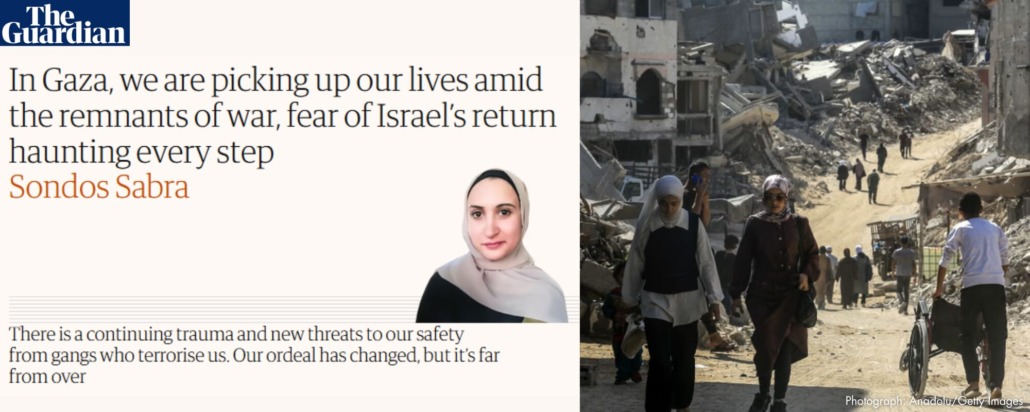
Batool’s diary is the shortest and heartbreakingly ends with the joy of the January 24 ceasefire and anguish at how hard it will be to go forward. With Sondos and Nahil, we see the relief of the ceasefire and the exhaustion and grief when Israel breaks the truce and the bombing starts again. We know what the diaries don’t reach: how much worse things will get. As I’m writing, in May 2025, there are more deaths every day, terrible hunger, talk of a takeover by Israel, talk of a truce, talk of Gazans forced to live somewhere else, and increasing outrage round the world, though our government shamefully supports Israel while saying it would like peace. The four diarists, I’m told, are alive.
Batool, Sondos, Nahil and Ala’a, thank you for letting me and others read your diaries, thank you for managing to write while so much was happening. Does it seem ridiculous to say your diaries are enjoyable? They’re painful and make us angry but it’s still a pleasure to know something of your lives. And your history.
May 16, 2025
Awards news:
- Two Biblioasis authors are finalists for the 2025 Quebec Writers’ Foundation Literary Awards:
- stephanie roberts is shortlisted for the A. M. Klein Prize for Poetry for UNMET
- Lazer Lederhendler is shortlisted for the Cole Foundation Translation Prize for his translation of Christophe Bernard’s The Hollow Beast
- Catherine Khordoc was named a finalist for the John Glassco Translation Prize, for her translation of Mélikah Abdelmoumen’s Baldwin, Styron, and Me.
In other good publicity news:
- Voices of Resistance: Diaries of Genocide received a starred review from Publishers Weekly: “[A] stunning collection . . . The four women’s descriptions of constant violence are vivid, and so too are their accounts of profound kindness and care . . . This bursts with life in the face of shocking horror.”
- An excerpt from Voices of Resistance contributor Sondos Sabra appeared in Truthdig, and a new entry was featured in the Guardian.
- Benbecula by Graeme Macrae Burnet was featured the Guardian’s crime fiction round-up: “Dark, intense and utterly compelling.”
- Self Care by Russell Smith was reviewed in the Ottawa Review of Books: “Self Care is a revealing rollercoaster ride, a compassionate yet unflinching window into troubled lives of today’s young adults.”
- Baldwin, Styron, and Me by Mélikah Abdelmoumen (trans. Catherine Khordoc) was reviewed in the Ottawa Review of Books: “Important and very timely . . . An enthralling read of enormous value.”
- Ray Robertson was featured in the Chatham Daily News about his forthcoming Dust: More Lives of the Poets (with Guitars): “A followup to 2016’s Lives of the Poets (with Guitars), it features more big-name and lesser-known performers, from Danny Kirwan, Handsome Ned, Captain Beefheart and Nico to Duane Allman and Muddy Waters.”

